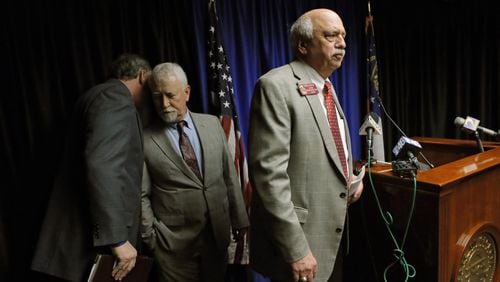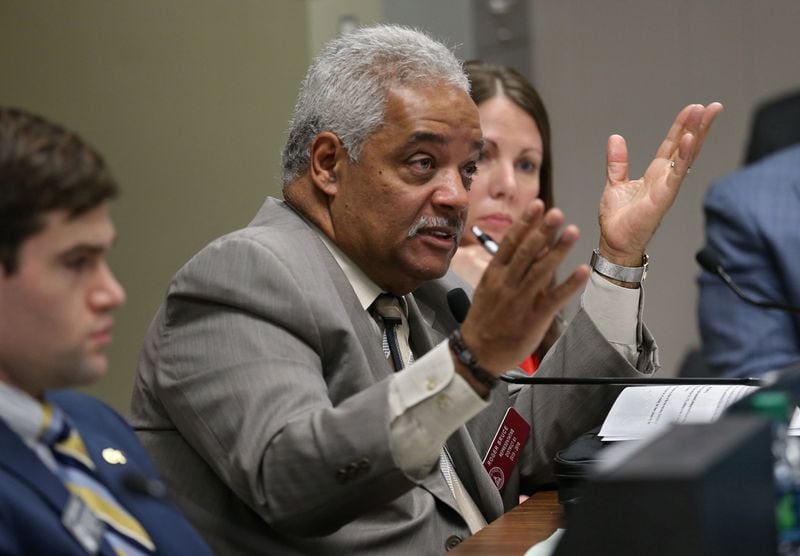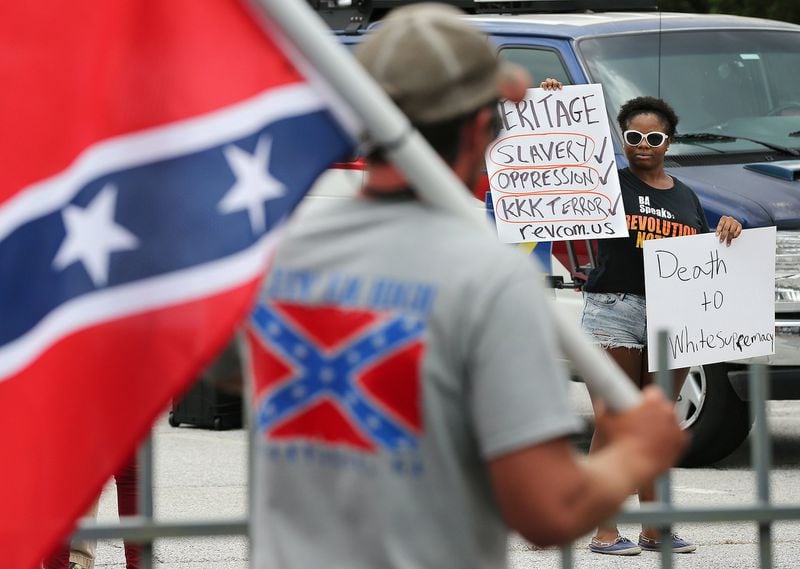When House Speaker David Ralston punished fellow Republican Rep. Tommy Benton last week, stripping him of his committee chairmanship and removing him from a study committee on civics education, it came after nearly two years of provocative political acts.
But it was the distribution to his House colleagues of an article from the magazine “Confederate Veteran” that triggered Ralston’s disciplinary move. The article challenges the historical consensus that slavery was the primary cause of the Civil War.
So why is a state lawmaker in 2017 sending an article about a 156-year-old conflict to his colleagues like it’s breaking news?
"All of this is about how we think about history," said Kevin Levin, a Civil War historian and author of the blog "Civil War Memory" blog.
Levin said the debate over the causes of the Civil War has always been as much about contemporary politics and power as it has been about history.
“Who controls history also controls the present,” he said. “It’s about who we are today and who gets to control what.”
Levin said the idea of the Civil War as a “Lost Cause” fought by Southern states defending themselves from Northern federal intrusion has its roots in the 1890s as Southern whites sought to regain political control and roll back the political freedoms of African Americans after the end of Reconstruction. “Confederate Veteran” was founded during this period and became an important organ in perpetuating the idea of the Southern struggle as virtuous and only casually connected to slavery.
Since that time, Southern politicians have clung to the Lost Cause theory as a kind of “rear-guard action” against social change, Levin said.
Credit: Bob Andres
Credit: Bob Andres
But is this what we elect our lawmakers to do? Not according to Rep. Roger Bruce, D-Atlanta, who serves on the House Human Relations and Aging Committee that Benton chaired until last week.
Bruce said he defends Benton’s right to say what he wants and believe what he wants “as long as those things do not lead to harm or violence.” But he said there are consequences to speech and Benton’s statements and actions don’t set a proper example of legislative leadership.
“If you are going to hold a leadership position in this state then you need to recognize that the position carries responsibility,” he said. Part of that responsibility is to model a sense of fair leadership for all Georgians, he said.
“Some of these comments would lead someone to believe he could not carry out these responsibilities in a fair way,” Bruce said.
For the record, Bruce, who is black and a Democrat, did not receive a copy of the treatise Benton sent to other colleagues at the Capitol.
Ralston has not fully explained his thinking, but it is safe to assume that Benton’s punishment was due to an accumulation of demerits.
A Civil War buff and former middle school social studies teacher, Benton, R-Jefferson, had publicly stated the Ku Klux Klan "made people straighten up" and referred to enslaved African Americans as "property" for which Southern slave owners had not been compensated.
He introduced legislation that would have forced the state to formally recognize Confederate Memorial Day, Confederate History Month and Robert E. Lee's birthday. He sponsored another bill that would have caused streets renamed since the assassination of Martin Luther King Jr. to revert to their original names, a move that would have caused, in some cases, streets currently named for civil rights era leaders to revert to names representing Confederate generals.
Benton was pushed to withdraw some of his more provocative bills, but has never been publicly rebuked by the House's Republican leaders. That might be because Benton represents a portion of the GOP base that sees the reexamination of the South's multitude of Confederate memorials as a type of cultural warfare.
Credit: Curtis Compton
Credit: Curtis Compton
The debate over how to envision our shared history has become more heated over the past two years since a white supremacist, who used the Confederate battle flag as a prop, massacred black church goers in Charleston. Following the attack, lawmakers in Columbia, S.C., quickly approved a measure to remove the flag from the state Capitol and display it in a museum.
In the nearly two years that have followed, communities across the South have debated what to do about their own Confederate displays. Most recently, New Orleans removed prominent Confederate memorials. Closer to home, controversy has raged in Henry County over the removal of Confederate flags at a historic park.
The conservative populist rhetoric President Donald Trump used throughout his 2016 election campaign has emboldened some, like Benton, to be more forceful.
"We just elected a president that said he was tired of political correctness," Benton, who did not return calls seeking comment for this column, told WABE-FM in March. "We think that our heritage is just as important as everybody else's."
Levin said supporters of Confederate memorials see their view of history further moved to the margin. They are right to fear that, he said.
“The Confederate battle flag is never going to fly again on the South Carolina Capitol grounds,” he said. “In places like New Orleans, those monuments are never going back up. I think we’ve turned a corner on this.”
Maybe so, but Benton isn’t alone.
This year, the governors of Alabama and Mississippi both endorsed official Confederate heritage events. That they did so quietly is testimony to how times have changed.
In Virginia, Republican gubernatorial candidate Corey Stewart was more vocal, anchoring his campaign on a promise to protect the state's Civil War monuments from removal.
“The Civil War was not about slavery,” Stewart, a Minnesotan by birth, said in a campaign video shot in front of a statue of Confederate Gen. Stonewall Jackson. “It was really about, in the South — here in Virginia in particular — was that the North was invading, the federal government had grown out of control and they wanted to push back.”
If elected, Stewart promised to end the “politically correct madness” infecting the state. If the Confederate monuments came down, “the left” would come after monuments to the Founding Fathers who owned slaves, like George Washington. Then, he warned, they will come after the founding documents of the nation, including the Constitution.
“They are after our culture, they are after our history,” he said. “We are in a fight for our culture here, folks.”
Last week, Stewart narrowly lost in the GOP primary to former Republican National Committee chairman Ed Gillespie. According to The Washington Post, he already is contemplating a Senate run against Sen. Tim Kaine.










